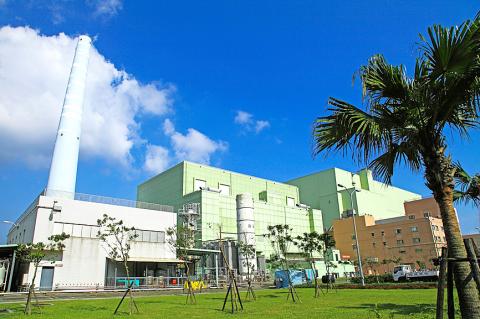Starting up the mothballed Fourth Nuclear Power Plant would take 10 more years and cost up to NT$70 billion (US$2.27 billion), according to conservative estimates, Atomic Energy Council (AEC) Minister Hsieh Shou-shing (謝曉星) told the Legislative Yuan in Taipei yesterday.
Plans to finish the power station in New Taipei City’s Gongliao District (貢寮) were officially abandoned in July 2015 under then-president Ma Ying-jeou (馬英九) and then-premier Jiang Yi-huah (江宜樺).
However, they and other nuclear power proponents have since called for the plant to be completed and put into operation.

Photo courtesy of Taiwan Power Co
Nuclear Myth Busters founder Huang Shih-hsiu (黃士修), whose referendum to abolish the Cabinet’s “nuclear-free homeland by 2025” policy were passed on Nov. 24 last year, last week filed two new proposals for referendums about nuclear power, including one seeking to start the plant.
It would take two or three more years and an additional NT$50 billion to finish building the power plant, assuming no political interference, Huang said.
Starting the plant would involve at least 10 years of preparation and expenditure of NT$60 billion to NT$70 billion, Hsieh said in response to questions from Democratic Progressive Party (DPP) lawmakers, adding that those are conservative estimates.
The Ministry of Economic Affairs and state-run Taiwan Power Co (Taipower) would need to file a proposal for review by the AEC if they want to unseal the plant, but it is hard to say how much time and money that would cost, he said.
In July last year, Taipower started shipping some of the plant’s 1,744 unused fuel rods back to its US supplier, and it would continue doing so, Hsieh said.
The government has not yet decided on the location of a site for the storage of highly radioactive nuclear waste and no municipality has expressed its willingness to provide space for such a site, he said.
DPP Legislator Su Chiao-hui (蘇巧慧) said the council should step up communication with the public, as their stance on nuclear power has become an unavoidable issue for any candidate running in next year’s presidential election.
Luckily, a magnitude 5.1 earthquake that was felt in Gongliao on Wednesday morning did not cause any disaster, but people have to know the potential risks of continuing to use nuclear power station, Su said.

Alain Robert, known as the "French Spider-Man," praised Alex Honnold as exceptionally well-prepared after the US climber completed a free solo ascent of Taipei 101 yesterday. Robert said Honnold's ascent of the 508m-tall skyscraper in just more than one-and-a-half hours without using safety ropes or equipment was a remarkable achievement. "This is my life," he said in an interview conducted in French, adding that he liked the feeling of being "on the edge of danger." The 63-year-old Frenchman climbed Taipei 101 using ropes in December 2004, taking about four hours to reach the top. On a one-to-10 scale of difficulty, Robert said Taipei 101

Nipah virus infection is to be officially listed as a category 5 notifiable infectious disease in Taiwan in March, while clinical treatment guidelines are being formulated, the Centers for Disease Control (CDC) said yesterday. With Nipah infections being reported in other countries and considering its relatively high fatality rate, the centers on Jan. 16 announced that it would be listed as a notifiable infectious disease to bolster the nation’s systematic early warning system and increase public awareness, the CDC said. Bangladesh reported four fatal cases last year in separate districts, with three linked to raw date palm sap consumption, CDC Epidemic Intelligence

Two Taiwanese prosecutors were questioned by Chinese security personnel at their hotel during a trip to China’s Henan Province this month, the Mainland Affairs Council (MAC) said yesterday. The officers had personal information on the prosecutors, including “when they were assigned to their posts, their work locations and job titles,” MAC Deputy Minister and spokesman Liang Wen-chieh (梁文傑) said. On top of asking about their agencies and positions, the officers also questioned the prosecutors about the Cross-Strait Joint Crime-Fighting and Judicial Mutual Assistance Agreement, a pact that serves as the framework for Taiwan-China cooperation on combating crime and providing judicial assistance, Liang

US climber Alex Honnold left Taiwan this morning a day after completing a free-solo ascent of Taipei 101, a feat that drew cheers from onlookers and gained widespread international attention. Honnold yesterday scaled the 101-story skyscraper without a rope or safety harness. The climb — the highest urban free-solo ascent ever attempted — took just more than 90 minutes and was streamed live on Netflix. It was covered by major international news outlets including CNN, the New York Times, the Guardian and the Wall Street Journal. As Honnold prepared to leave Taiwan today, he attracted a crowd when he and his wife, Sanni,